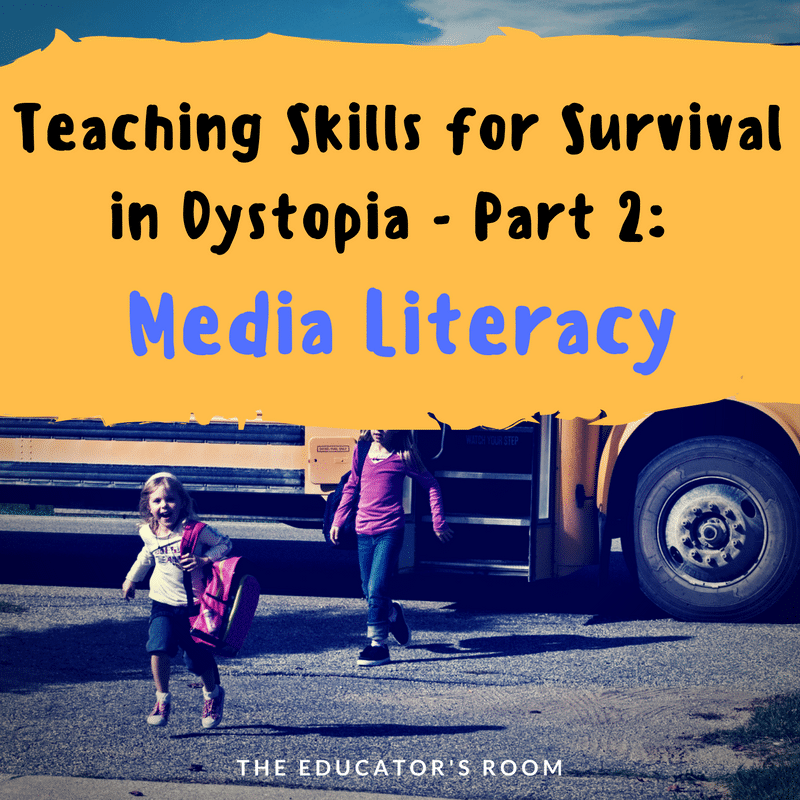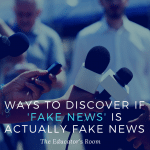In the wake of Donald Trump’s election, it has become increasingly clear that we are entering an abnormal era of American history. The xenophobia, religious intolerance, and white supremacy, aren’t new to life in America. But, Donald Trump’s presidency has made many of us feel that the “moral arc of the universe” is bending away from justice. In addition to the proliferation of hate crimes, many of us also worry about a general trend toward authoritarianism and kleptocracy. What will happen to freedom of speech? To what extent is Donald Trump going to exploit the office of President for his own enrichment? It’s clear we need to prepare our students for life in this dystopia. Previously I wrote about the need to cultivate radical imagination. The next skill we need to add to that tool box is media literacy.
[bctt tweet=”It’s clear we need to prepare our students for life in this dystopia.” username=”EducatorsRoom”]
Media Literacy
Media literacy has always been an important part of civic education. However, in the wake of an election potentially swayed by “fake news” this skill is especially vital now.
A recent Stanford study showed that high school students lack basic competencies in deciphering real content from fake. As reported in Education Week:
“According to researchers, only 20 percent of 454 high school students asked to evaluate the screen-cap delivered a “mastery” level critique of whether the source could be trusted to depict what it purports to show.
Forty percent of students didn’t question whether the post showed reliable evidence of conditions near the plant.
According to a report issued by the Stanford History Education Group, which administered the Fukushima flower question and a battery of other “civic online reasoning” tests to students from middle schools to college ages, ‘young people’s ability to reason about the information on the internet can be summed up in one word: bleak.‘”
Our democracy depends on an informed citizenry, and in the age of age of social media, being informed requires more work than ever. But media literacy goes beyond simply telling fact from fiction. Additionally, we need to teach our students to spot the falsehoods and bias embedded in “real news.”
Read News Critically
When publications like The Los Angeles Times are tweeting glamour shots of avowed white supremacists, we know we’re in trouble. In the weeks since Trump’s election an array of media outlets including The New York Times and CBS News have serviced the normalization of hate speech from the alt-right and lies from Donald Trump. But aside from uncritical coverage of white supremacy and pathological lying, we must teach students to watch out for the day-to-day biases inherent in all writing.
Whether it’s a news article or a history textbook, we must teach students to question. We must teach them to seek out multiple sources. And we must teach them to seek out typically marginalized voices that. Recently in my own I showed a Newsela article to my students on the Standing Rock protests against the Dakota Access Pipeline. These two sentences caught my eye:
“Sheriff Kyle Kirchmeier said the protesters are creating safety problems. Nearly 30 protesters have been arrested in the last few weeks.”
They were especially problematic given the comprehension question that came at the end of the text. Newsela asked my students: “Which sentence from the article shows why some people have been arrested?
(A) They ride horses and drive pickup trucks.
(B) Sheriff Kyle Kirchmeier said the protesters are creating safety problems.
(C) Even some Hollywood actors have joined them.
(D) The tribe said the pipeline would hurt their ancient places.”
Without critical reading and additional research, the logical conclusion is that law enforcement arrested protestors because they acted unsafely. This narrative completely erases the claims that Native Americans have been exercising their first amendment rights, and law enforcement has been acting in violation of these rights.
Openness and Skepticism
We must teach our students to look at the world around them with openness and skepticism. We need our students to know that Pope Francis did not endorse Donald Trump. But we also need them to know that when Donald Trump tweets that “millions of votes” were illegal, that is is false, no matter what CBS News reports. And finally, we need our students to know the truth about America’s history of slavery and Native American genocide.
[bctt tweet=”We must teach our students to look at the world around them with openness and skepticism” username=”EducatorsRoom”]
These skills were necessary before Donald Trump’s election, but students today need them more than ever.






